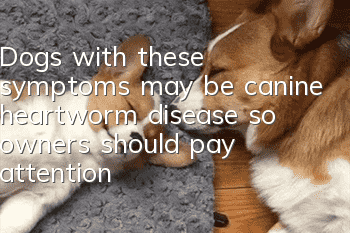Dogs with these symptoms may be canine heartworm disease, so owners should pay attention!

Heartworm is a parasite in dogs, but this is no ordinary parasite, it is the big boss among parasites! Not only can it grow to 30 centimeters, its lifespan can reach 7 years, but it is also terrifyingly lethal. force. It usually parasitizes the right atrium and pulmonary artery of dogs. If it is not discovered in time, it can cause serious diseases such as severe lung disease and heart disease, and even death. Therefore, heartworm disease is also known as the "silent killer" of dogs!
What is canine heartworm disease?
Heartworm disease is a serious disease that can cause severe lung disease, heart failure, other organ damage, and death in dogs. Heartworm disease is not spread directly between dogs, but rather through mosquito bites. When a dog is bitten by a mosquito, the heartworm eggs carried by the mosquito will enter the dog's body. After about 7 months of growth, the larvae develop into adult heartworms and invade the dog's heart, lungs, and blood vessels.
An adult heartworm can be 15 to 30 centimeters long. They generally have a lifespan of 5 to 7 years, and the adult heartworm will produce a large number of heartworm eggs, which will be distributed throughout the dog's body. of every part. When mosquitoes bite dogs, these larvae will be transmitted to other dogs through the mosquitoes. In this way, the closed transmission chain of dogs → mosquitoes → dogs is completed. The scary thing is that dogs may have anywhere from 1 to 250 heartworms in their bodies.
Symptoms of canine heartworm disease
The severity of heartworm disease is related to how many heartworms are present in the dog's body, how long the dog has been infected, and how the dog's body responds to the heartworms. There are four stages of heartworm disease. The later the stage, the more serious the disease and the more obvious the symptoms.
Stage 1: Asymptomatic or mild symptoms, such as occasional cough. Stage 2: Mild to moderate symptoms, the dog may cough occasionally after exercise or feel tired. Stage 3: More severe symptoms, such as frailty, persistent cough, even refusal to exercise, difficulty breathing and heart failure. With stages 2 and 3 of heartworm disease, changes in the heart and lungs can usually be seen on a chest x-ray. Stage 4: Also called Kaval syndrome. The number of heartworms in the dog's body is so high that the blood flow back to the heart is blocked by a large number of heartworms. Kaval syndrome can be life-threatening, and surgery to remove heartworms is the only treatment option. But surgery is risky, and even surgery can kill your dog. Of course, not all dogs with heartworm disease will develop Kaval syndrome. However, failure to detect or treat heartworm disease in time can also damage the dog's heart, lungs, liver and kidneys, and even lead to death.
Treatment of canine heartworm disease&Prevention methods
Mirasomine dihydrochloride is an arsenic-containing drug that kills adult heartworms in dogs. This medicine is effective in treating stages 1-3 of heartworm disease when injected deep into the muscles of the back. In addition, imidacloprid and moxifloxacin can also be used to clear microfilariae from the blood of dogs. If your dog has KaVo syndrome, the only option is surgery to remove the heartworms from the heart.
Of course, the best way to prevent heartworm disease is to get regular vaccinations and deworming. But before injecting the vaccine, it is best to pass a blood test to see if the dog is infected with heartworms. Because dogs are vaccinated when they are infected with heartworms, they are likely to have adverse reactions.
In addition, in order to detect heartworms early, it is best for owners to take their dogs for regular physical examinations. However, if the dog is checked before 6 months of age, it is likely that heartworms will not be detected because heartworms have not yet fully developed in the puppies. Therefore, it is recommended that after the dog is 7 months old, the owner should take the dog for a physical check-up every six months to one year.
Some dog owners think that vaccinating and deworming dogs is troublesome, but in fact many diseases and parasitic infections can be avoided through this work. If you want your dog to be free from all diseases, in addition to providing it with a healthy and balanced diet, adequate exercise and a clean and tidy environment, regular vaccinations and deworming are also important!
- Precautions for feeding Doberman puppies
- Misunderstandings about dog vaccinations
- What to do about alopecia in Bichon Frize? How to treat alopecia in Bichon Frize?
- What should I do if my Australian Cattle Dog vomits after eating too much?
- What is the best calcium supplement for puppies and dogs? Calcium supplement for dogs!
- Scottish shepherd dog hair beauty food
- How to train a horse dog not to be vicious? How to train a horse dog to be courageous!
- Reasons why dogs hiccup and vomit
- Symptoms and prevention of roundworms in dogs
- How should dogs be cared for from pregnancy to delivery?



